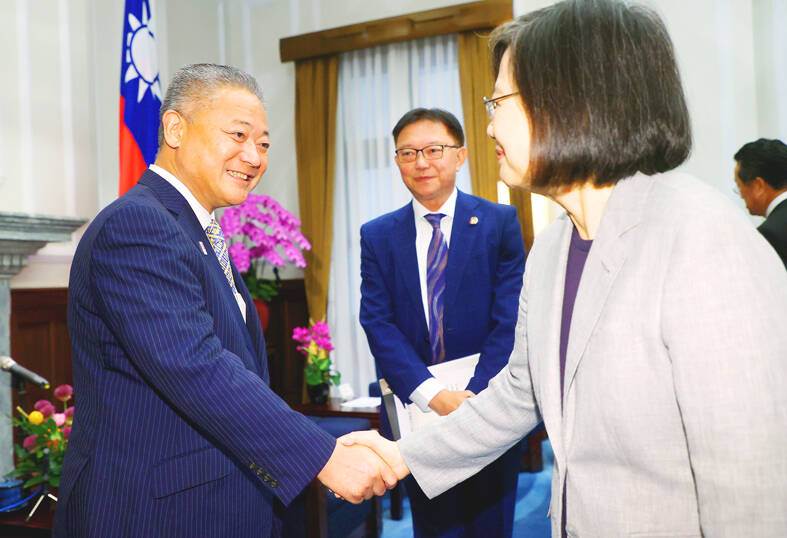“Taiwan’s peace is Japan’s peace,” visiting Japan Innovation Party leader Nobuyuki Baba told a news conference in Taipei on Wednesday, calling for joint efforts to deter a Chinese invasion.
Baba arrived in Taiwan on Tuesday for a three-day visit, leading nine other Japan Innovation Party lawmakers.
Both Tokyo and Taipei are doing their best to deter a Chinese attack, which would seriously affect the livelihoods of the more than 25,000 Japanese living in Taiwan, Baba said.

Photo: CNA
Any such military action would also likely affect Japanese islands near Taiwan, he added.
“Therefore, people in Japan believe in the saying that ‘a Taiwan emergency is a Japanese emergency,’ or we can say ‘Taiwan’s peace is Japan’s peace,’” he said.
Tokyo is seeking to increase defense spending to 2 percent of the nation’s GDP from the current 1 percent, he said.
Taiwan and Japan should work together to constitute a strong joint defense against Beijing, including by building deeper intelligence-sharing networks, he said.
Baba acknowledged that Japan and China have close economic and trade exchanges, with many Japanese companies doing business in China.
“We are not saying no to China on all fronts,” but as a country that values democracy and human rights, Japan is not accepting everything Beijing says and does, he said.
Earlier the same day, the group met with President Tsai Ing-wen (蔡英文), who urged the Japanese lawmakers to support Taiwan’s bid to join the Comprehensive and Progressive Agreement for Trans-Pacific Partnership.
In other news, Kevin Maher, former head of the Office of Japan Affairs at the US Department of State, told Nikkei Shimbun that Tokyo’s slow decisionmaking process would affect the US’ response in the event of a Chinese invasion of Taiwan.
The Tokyo-based think tank Japan Forum for Strategic Studies hosted a tabletop exercise in Tokyo last month in collaboration with military officials and analysts from Taiwan, the US and Japan simulating a Chinese invasion of Taiwan.
The exercise included a scenario in which the Chinese military landed on the Diaoyutai Islands (釣魚台), known as the Senkakus in Japan, Nikkei reported.
“We had to wait for the Japanese prime minister, in the scenario — two weeks — to say that this is an armed attack on Japan,” Maher said.
The US, Japan and Taiwan have to coordinate closely while preparing to respond to a crisis that would affect Taiwan, he said, adding that the Diaoyutai Islands must be included in the preparation, as it is closely tied to what would happen in Taiwan.
A slow decisionmaking process would weaken the effectiveness of deterrence, he said.
Tokyo must first declare the situation an “armed attack” against Japan for it to work with the US on a military response, he said.
If Japan delays such a declaration out of a desire to avoid conflict, “it really ties the US’ hands,” he added.
Christopher Johnstone, former East Asia director for the US National Security Council, urged the establishment of a trilateral mechanism of coordination between Japan, the US and Taiwan to decide the responsibilities of military operations and evacuating civilians, Nikkei reported.
During the tabletop simulation, “there was no discussion about Japan’s role, beyond defending its own territory,” he said.

MAKING WAVES: China’s maritime militia could become a nontraditional threat in war, clogging up shipping lanes to prevent US or Japanese intervention, a report said About 1,900 Chinese ships flying flags of convenience and fishing vessels that participated in China’s military exercises around Taiwan last month and in January last year have been listed for monitoring, Coast Guard Administration (CGA) Deputy Director-General Hsieh Ching-chin (謝慶欽) said yesterday. Following amendments to the Commercial Port Act (商港法) and the Law of Ships (船舶法) last month, the CGA can designate possible berthing areas or deny ports of call for vessels suspected of loitering around areas where undersea cables can be accessed, Oceans Affairs Council Minister Kuan Bi-ling (管碧玲) said. The list of suspected ships, originally 300, had risen to about

DAREDEVIL: Honnold said it had always been a dream of his to climb Taipei 101, while a Netflix producer said the skyscraper was ‘a real icon of this country’ US climber Alex Honnold yesterday took on Taiwan’s tallest building, becoming the first person to scale Taipei 101 without a rope, harness or safety net. Hundreds of spectators gathered at the base of the 101-story skyscraper to watch Honnold, 40, embark on his daredevil feat, which was also broadcast live on Netflix. Dressed in a red T-shirt and yellow custom-made climbing shoes, Honnold swiftly moved up the southeast face of the glass and steel building. At one point, he stepped onto a platform midway up to wave down at fans and onlookers who were taking photos. People watching from inside

Japan’s strategic alliance with the US would collapse if Tokyo were to turn away from a conflict in Taiwan, Japanese Prime Minister Sanae Takaichi said yesterday, but distanced herself from previous comments that suggested a possible military response in such an event. Takaichi expressed her latest views on a nationally broadcast TV program late on Monday, where an opposition party leader criticized her for igniting tensions with China with the earlier remarks. Ties between Japan and China have sunk to the worst level in years after Takaichi said in November that a hypothetical Chinese attack on Taiwan could bring about a Japanese

The WHO ignored early COVID-19 warnings from Taiwan, US Deputy Secretary of Health and Human Services Jim O’Neill said on Friday, as part of justification for Washington withdrawing from the global health body. US Secretary of State Marco Rubio on Thursday said that the US was pulling out of the UN agency, as it failed to fulfill its responsibilities during the COVID-19 pandemic. The WHO “ignored early COVID warnings from Taiwan in 2019 by pretending Taiwan did not exist, O’Neill wrote on X on Friday, Taiwan time. “It ignored rigorous science and promoted lockdowns.” The US will “continue international coordination on infectious